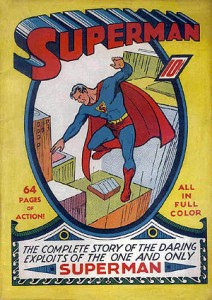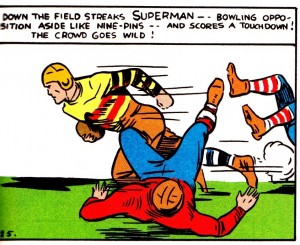 Every now and then something sort of little gives you pause and makes you consider something… bigger. In this case, “something little” is one of the very earliest comic book adventures of Superman. Published in Action Comics #4 (making it the Man of Steel’s fourth appearance), the story is called, predictably enough, “Superman Plays Football.” (It’s also re-printed in Superman #1.)
Every now and then something sort of little gives you pause and makes you consider something… bigger. In this case, “something little” is one of the very earliest comic book adventures of Superman. Published in Action Comics #4 (making it the Man of Steel’s fourth appearance), the story is called, predictably enough, “Superman Plays Football.” (It’s also re-printed in Superman #1.)
Well, that’s its title in the index at the Grand Comic Book Database. On the story, there’s no title. That was typical of Golden Age comic stories, as is the length of this one, just over twelve pages. Also typical, but disturbing, are the attitudes toward life, fair play and personal interaction displayed by the characters. Those are the “something bigger” or “somethings bigger” that I’m talking about. They’re attitudes which may have been typical of the time, but certainly not attitudes I would want to push off on young readers without some kind of comment. (Of course, now, young readers are unlikely to see this story. I think mostly only middle-aged nostalgia buffs like me are bothering to read Superman adventures from the 1930s.)
Here’s the story: A man is hit by a car, a victim of a “hit-skip,” which we’d today call and hit-and-run. The victim is in agony, but Superman, “champion of the weak and helpless” (it says so right here!) leaps into action… to chase the driver. Say, Superman, could you fly a brother to the ER first maybe? Nope. Gotta catch the driver. (And note that Superman couldn’t fly then, either. He could only jump far and outrun trains. So maybe he thought it was best to leave the victim to the care of an ambulance.)
Driver’s car stalls out on the railroad tracks in front of an oncoming train. This scares the car so badly that it changes from blue to green. The driver tries to prevent Superman from saving him. (“You fool!” cries Superman, “You’ll kill us both!” At this point in history, he was only faster than a locomotive, not more powerful. Getting hit by one, as far as he knew, would kill him.) Superman coaxes him out of the driver’s seat, though, in time to see the once-blue car smashed. The driver dies of a heart attack as soon as Superman sets him on the ground.
Kinda pointless, that. The two-page scene serves only to, well, to take up two pages with action, and to put our hero in the proximity of the train, where he overhears Coach Randall of Dale University is hiring professional thugs to play on his team in the upcoming game against rival Cordell, so that said thugs can “get” Cordell’s best players early on. “Rough stuff is our specialty,” the thugs assure Coach Randall.
“Sounds like just the sort of set-up I like to tear down,” says Superman; so, as Clark Kent, he reviews press clippings and finds that he bears a general resmblance to one Tommy Burke, Cordell’s Least Valuable Player. Applying grease paint to his face, Clark becomes the spitting image of Tommy. (Who, apparently, walks around wearing a lot of grease paint. It was the 30s. Dudes were vain and quirky.)
In the next scene, we meet the villain of the piece, even if the authors didn’t realize it. Her name is Tommy’s Girlfriend Mary, and, like, well all of the women in Superman’s life at the time, she looks just like Lois Lane. Acts like her too. When we meet her, she’s telling Tommy that he’s failed to become a football hero in the six or seven years she’s given him, so she’s arranged to replace him with Wallace Dodd, a tennis champion. A real athlete. This she calls, “delivering an ultimatum.” Um, okay… leaving you because you’re not famous and successful, already picked your replacement. So… um… yeah… or else!
Mary’s “ultimatum” seems to be missing its first half. It’s just a consequence, really. But don’t ask too much of Mary. You see, Mary is a shallow idiot. She’s got fewer brain cells firing in her pretty little skull than Tommy does in his thick one… and that ain’t sayin’ much.
As Tommy stalks away, resolved to get famous and then never look at Mary again, he meets Superman, now his identical twin because they both wear the same checkered suit and the same brand of grease paint. Superman, um, jabs Tommy with a hypo and then ties him up in his apartment. Only after telling him that he’s going to make Tommy “the greatest football player of all time.”
You see where this is going. Superman will steal Tommy’s identity, do some cool stuff that Tommy will get credit for and (gasp!) Mary will come back to Tommy! Geez, Clark, what did this poor, dumb schlub ever do to you, that you’d wish a fate like that on him?
I really hate Mary. In three brief panels, Siegel and Shuster, I’m sure unwittingly, created a vivid picture of a completely evil creature: a woman whose only interest in a man is the prestige he can bring into her life. She not only doesn’t stand by him when his career isn’t going well, she leaves him for a successful (snort!) tennis player! (Sorry. That snort was disrespectful. It just strikes me funny.) This is a manipulative, evil person who sees others only as things to be used.
And speaking of manipulative… Superman hits the locker room, where he accidentally opens the locker of Martin. So, you know, all lockers do look alike. It’s an understandable mistake. But Martin decides that accidentally opening his locker is grounds for violence, so he challenges Superman to a fight. Our hero lets Martin beat on him for a while, then flips him away with a back-handed gesture and knocks him unconscious.
Coach Stanley (keep in mind this is the good guy) enters, sees Martin unconscious, and, asking no questions, throws “Burke” off the team. Um, ya think maybe your guy who started fist fights over an accidental locker-opening might also rate some discipline? Oh, he’s your star-player? Never mind. I guess football always was football, huh? There’s nothing wrong with grown men beating on each other for little to no reason. It’s just “boys being boys.”
So, of course, Superman as Burke ignores the coach, joins the game, and wins it for Cordell. But not before Coach Stanley (the good guy, remember!) orders all his players to physically assault “Burke” for disobeying orders. Ah, the simpler times…
After Superman returns to Burke’s apartment, where a shirtless Burke, presumably still chained by the ankle, drinks tea, smiling, while his kidnapper reads the newspaper (Holy Stockholm Syndrome, Batman!), Coach Randall’s thugs visit and kidnap the real Burke, thinking they’re taking Cordell’s secret weapon. Imagine Randall’s surprise when he visits his rival coach to gloat, and finds “Burke” in the office. Superman, as Burke, tells Randall to fire the thugs and resign. So naturally Randall pays the thugs to shiv Superman during the game. This doesn’t work very well, as you can imagine.
Meanwhile, Tommy has escaped his kidnappers (he apparently only enjoyed bondage when it was inflicted on him by his identical twin) and come to the game as a fan. In the stands, he overhears Mary telling her tennis player that her Tommy is a real he-man. Superman wins the game for Cordell, Coach Randall resigns, Coach Stanley is… um… the good guy, Mary slithers her sickening, reptilian coils about Tommy’s throat and orders him to stop playing football…
And they all live happily ever after.
The sad thing is, to a lot of people, that probably looks like happily ever after. I guess a guy as dumb as Tommy doesn’t know what happiness is, unless, you know, it was that time he was drinking tea and gazing with a smile into the eyes of a man who cared enough to chain him to his bed. So, barring a chance to enter into an SM relationship with a man from another planet, he decides being manipulated by this skanky ho for the rest of his days seems like a pretty good deal.
It’s actually a lot like the relationship between Clark Kent and Lois. Lois doesn’t prefer Superman to Clark. She actively hates Clark, because he’s not Superman. At least, that’s early Lois. She’s just sort of the Lucy Van Pelt of the DC Universe. You wonder why Superman even bothers to rescue her, since she’s no less villainous than Lex Luthor, really. Her motives are just as self-serving and evil, and her behavior towards others is usually less civilized.
I guess the Superman I grew up with, the later Superman, just stood for more virtuous values. He didn’t like violence. He wouldn’t just have knocked out a bully, he would have taught the bully a lesson about how to treat others. He wouldn’t have just cheated and taken Tommy’s place, he would have seen to it that his example changed Tommy’s life for the better. Leaving Tommy jobless with a social-climbing harpy was not changing his life for the better. It’s like the S & S just weren’t seeing how completely unlikable and virtue-less everyone in their story was. No disrespect for these legends of the field. I think a lot of the problem is that they were just young, inexperienced, and prone to follow the attitudes and stereotypes of the time: that men should be “he-men,” that it was okay for a woman to just blatantly demand a “good provider” and offer no compassion or understanding in return, that violence is just something that happens, and participating in it doesn’t make you a good person or a bad person.
I think it’s important to recognize these attitudes, though. Sometimes they still advise us, even today.
And that’s something bigger.
